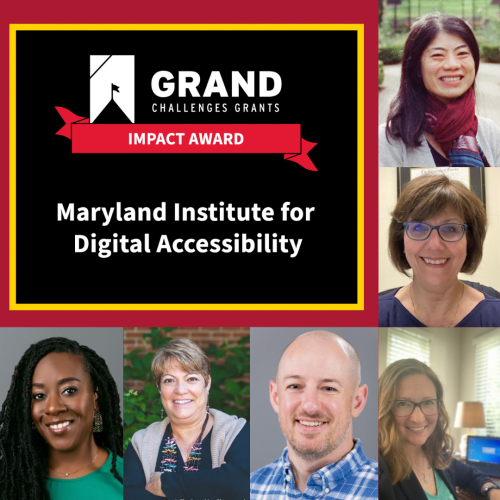HESP faculty Kathy Dow-Burger, Lacey Curry, Eric Hoover, Yi Ting Huang, Eusebia Mont, and Lisa Rickard are collaborators for one of the 6 Grand Challenge Impact Awards, Maryland Institute for Digital Accessibility. Additionally, Eric Hoover is part of the team on a second Grand Challenge Impact Award, Values-Centered Artificial Intelligence.
The Grand Challenges Grants Program — the largest and most comprehensive program of its type ever introduced at the University of Maryland — will support projects that address emerging societal issues, including climate change, social injustice, global health, and education disparities. Grand Challenges Impact Awards support cross-disciplinary collaborations that address a grand challenge focus or theme. Impact Awards provide up to $250K per year for 2 years of funding, which includes a 1:1 match of resources from participating colleges and/or departments.
Maryland Institute for Digital Accessibility
Summary:
The world of digital technologies and content is designed to meet the needs of the average person, often creating inaccessibility for people with disabilities. That means that over 20% of people are structurally excluded from education, employment, and healthcare. The Maryland Institute for Digital Accessibility will make technology accessible and help make the world more inclusive of and for people with disabilities.
Our goal is to change technology design research and practice so that it involves the disability community as an equal partner, accessibility is proactively built-in, and technology is “born-accessible.” Successfully transforming technology research and development to be born-accessible and sustainable requires the involvement and advocacy, from the beginning, of disability rights groups as equal partners with academic researchers and with technology companies.
The connections between these communities and strong interdisciplinary and cross-sector teams of experts, will create more effective, more impactful R&D projects on accessibility.
These projects will make more digital technologies and content accessible for people with disabilities and create technologies that may alleviate inaccessibility in the physical world, leading to fewer structural barriers, more inclusion in society, better educational outcomes, and employment success for people with disabilities.
Values-Centered Artificial Intelligence
Summary:
Artificial Intelligence (AI) presents tremendous opportunities for improving the lives of billions of people in areas including healthcare, education, transportation, and communication — to name just a few. However, AI solutions that address societal problems in high-stakes settings cannot be developed in isolation. These technologies need to be designed and evaluated within the contexts in which they will be deployed, and respect the human norms, values, and societal expectations that govern those contexts.
The goal of our center is to promote the development of AI in a way that is not only ethical, but that advances human well-being more generally. The center will focus on development of the tools, theories, and practices needed to ensure that AI applications are transparent, fair and trustworthy, support human creativity, and facilitate privacy – in short, that they respect human values.
To accomplish this, the center will bring together under one roof a community of researchers in three main areas: (1) AI proper, to develop new technology that pushes the boundary of what is possible and is also responsive to relevant human concerns, (2) Philosophy, to develop formal tools for representing and reasoning substantively about values, and (3) Human-Computer Interaction, to better adapt AI systems to people.
Beginning with use-cases in areas such as education, transportation, healthcare, communication, accessibility, teaming, and sensemaking, we will also collaborate with domain experts and stakeholders in these fields.
The center aims to have local, national, and international impact by working to change the practice of AI innovation from a technology-centered approach to a values-centered approach, combining top-down ethical considerations and bottom-up community insights. This new approach is novel in the world and has the potential to transform the practice of AI globally.
Source: https://research.umd.edu/mida; https://research.umd.edu/vcai



